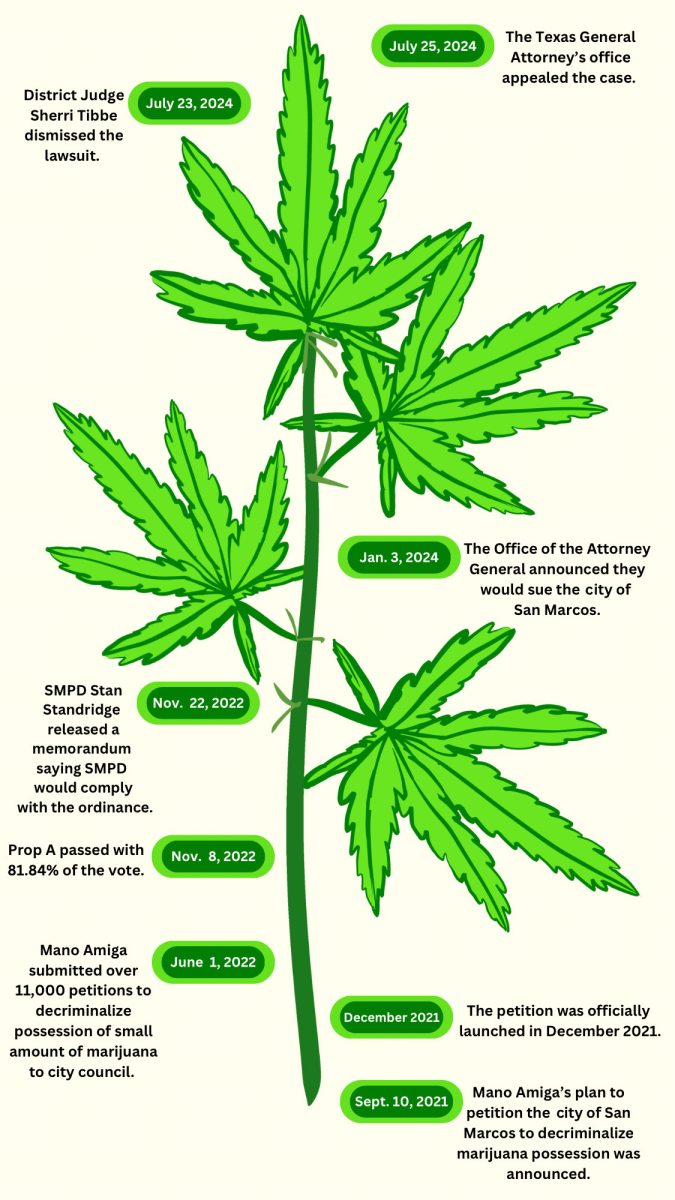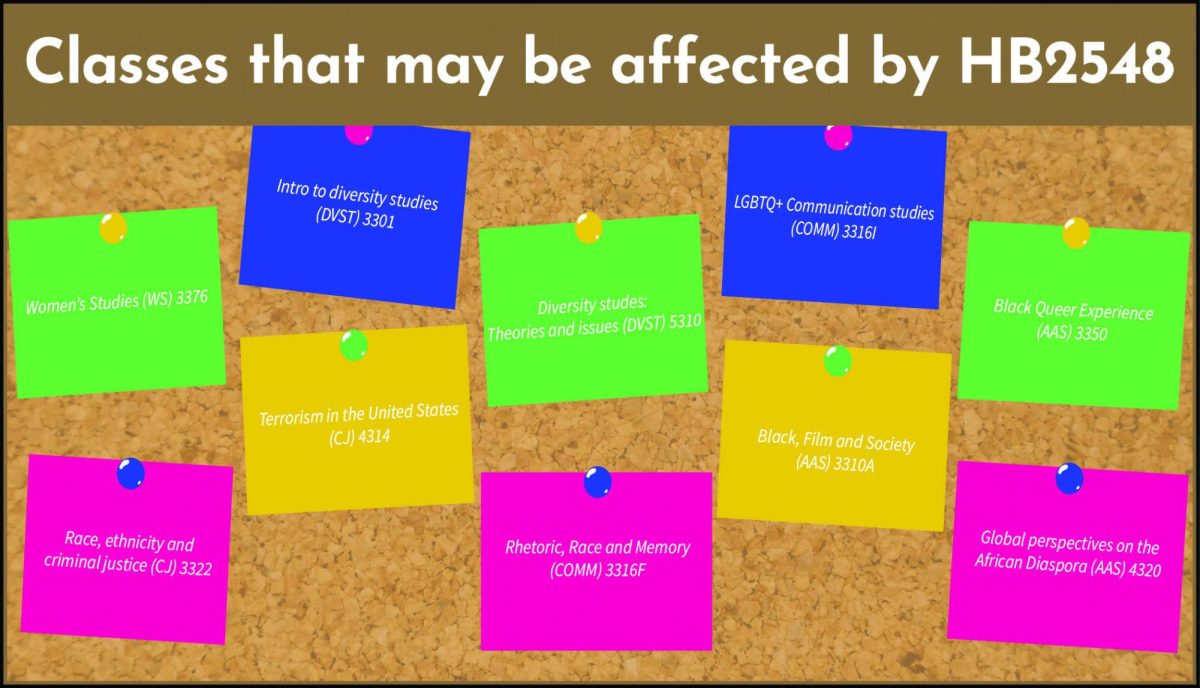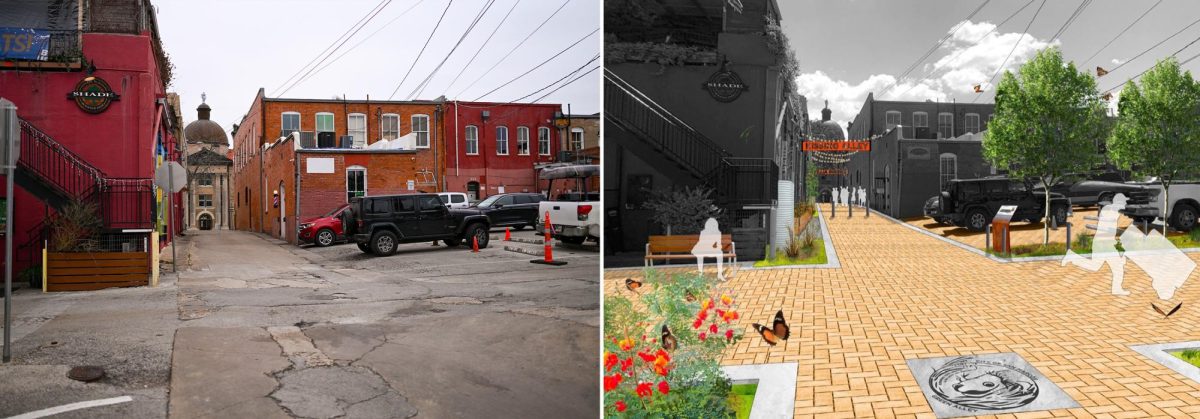The Texas Office of the Attorney General (OAG) has appealed the dismissal of its lawsuit against San Marcos over marijuana decriminalization. However, neither the dismissal nor the appeal affect marijuana enforcement at Texas State.
The appeal was filed just one day after Judge Sherri Tibbe of the 453rd Judicial District in Texas ruled the state did not have the jurisdiction to sue. The lawsuit will now go before the 3rd Court of Appeals.
“I think the appeals about [the case] being appealed are like any of the concerns we had previously, I think it is ultimately up to a judge’s interpretation of the law,” Eric Martinez, executive director of Mano Amiga said.
The lawsuit was originally filed by Attorney General Ken Paxton against Austin, Killeen, Denton, Elgin and San Marcos on Jan. 31. The OAG believes cities cannot decriminalize marijuana without violating state drug laws.
Mano Amiga was one of the organizers behind Proposition A, the 2022 ballot measure that decriminalized up to four ounces of marijuana in San Marcos.
Martinez said his organization was excited to hear the lawsuit was dismissed, and is not disheartened by the case being appealed. He said Mano Amiga will continue to oppose the lawsuit by filing briefs.
“We will continue to submit friends of the court briefs and show up to provide a public community presence to show the appeals court that this is a widely supported community initiative,” Martinez said.
Catina Voellinger, the executive director of Ground Game Texas, another organization behind Proposition A, said she was not surprised by the OAG’s continued fight against marijuana decriminalization.
Voellinger said the OAG was not acting as if they were really focused on the case. On Aug. 13, the 3rd Court of Appeals sent a letter to the OAG to notify them they had failed to meet the original deadline to pay for records for the trial court clerk’s records.
“It looks like they missed the first deadline to advance the appeal in San Marcos early. It is not a huge error, but it shows there’s not a lot of teeth in what they’re doing,” Voellinger said.
Voellinger said Ground Game Texas will continue to oppose the lawsuit as long as they can afford to do so.
“These things are going to take years. So we’re going to keep working, and we’re going to keep organizing for progressive policy and what we can do locally until there is nothing to oppose,” Voellinger said.
Until a ruling is issued by the 3rd Court of Appeals, the San Marcos Police Department will still not issue arrests for possession of four ounces or less of marijuana, unless another crime is committed.
No court dates are currently scheduled for hearings or the trial of the lawsuit in the 3rd Court of Appeals.
Lawsuit or not, Proposition A does not extend to the University Police Department (UPD). This means that UPD is free to make arrests, or issue citations for marijuana possession on or off campus.
“We changed our practice to be mostly citations, or warnings, versus an arrest for misdemeanors,” UPD Chief Matthew Carmichael said.
Under the Drug-Free Schools and Communities Act Amendments of 1989, universities are required to enforce federal drug enforcement laws. Failing to enforce drug laws could result in the complete loss of federal funding, including financial aid for students.
Carmichael said in most cases, students who are arrested are referred to the Dean of Students.
“I know students think that is to get them in trouble,” Carmichael said. “For us, that is to make sure Student Success knows that you aren’t in crisis, that you’re healthy and that you may have to go through health education.”
Under House Bill 1325, passed in 2019, Texas legalized hemp, which was defined as any cannabis plant that contained less than 0.3% Delta 9 THC.
“We have very little interactions with those products because what’s different from the city is that we’re a smoke and tobacco free campus. You can’t vape, you can’t smoke, you can’t chew, you can’t spit and you can’t have those products,” Carmichael said.





















